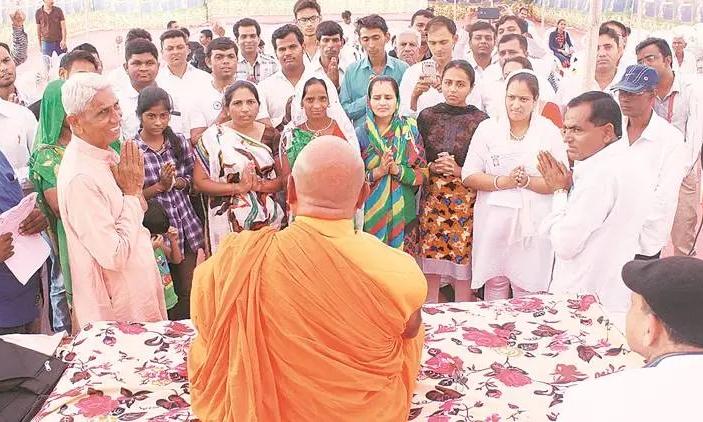
To curb conversion: Gujarat HC rules Hindu conversion to Buddhism subjected to procedures
text_fieldsThe Gujarat High Court has ruled that Buddhism holds a distinct religious status, affirming that conversions from Hinduism to Buddhism, Jainism, and Sikhism must comply with the procedures stipulated in the Gujarat Freedom of Religion Act, 2003.
A circular, issued by the Home Department on April 8th, sheds light on the need for prior approval for conversions from Hinduism to Buddhism, Jainism, and Sikhism under the Gujarat Freedom of Religion Act, 2003. It emphasizes that Buddhism should be regarded as an independent faith, distinct from Hinduism, contrary to previous interpretations by some district magistrates.
Reports reveal that the decision came after the government observed discrepancies in the handling of conversion applications, particularly those transitioning to Buddhism, mostly undertaken by Dalits during festivals like Dussehra. The circular highlights concern over the arbitrary interpretation of the Act, with some offices disregarding the necessity for prior permission in conversion cases.
This move comes amid a backdrop of increasing conversions to Buddhism in Gujarat, predominantly among Dalits, often organized by institutions like the Gujarat Buddhist Academy (GBA). Ramesh Banker, Secretary of GBA, welcomed the clarification, affirming Buddhism's autonomy and the necessity of adhering to legal procedures for conversions.
The circular outlines a prescribed format for conversion applications, mandating detailed information about the individual(s) seeking conversion, the reasons for their decision, and the overseeing religious head or 'dharmguru.' Notably, applicants must submit the form to the district magistrate at least one month before the scheduled conversion event.
In recent years, the trend of Dalit conversion to Buddhism has gained momentum, with events witnessing hundreds, if not thousands, embracing the faith. Notable instances include the conversion of over 2,000 individuals in 2023, including the victims of the 2016 Una public flogging incident, underscoring a deeper societal shift and the quest for identity among marginalized communities.
However, this clarification has broader implications, given the legal framework it operates within. The Gujarat Freedom of Religion Act, amended in 2021 to curb forced conversions, carries severe penalties, including imprisonment of up to 10 years and hefty fines, placing the onus of proof on the accused.
Moreover, the Act's recent amendments, particularly those addressing conversions through marriage, have sparked legal challenges, with the matter currently pending before the Gujarat High Court. Critics argue that such legislation infringes upon individual freedoms and targets vulnerable communities, exacerbating social tensions.
The government's decision to issue this circular reflects a nuanced attempt to balance religious freedom with regulatory oversight, seeking to prevent coercive or fraudulent conversions while respecting individuals' rights to choose their faith. However, it also underscores the complexity of navigating religious identities within a legal framework shaped by historical and socio-political dynamics.
As debates continue over the interpretation and application of laws governing religious conversion, the circular serves as a reminder of the evolving landscape of religious pluralism and the imperative of ensuring legal clarity and procedural fairness in such matters.























